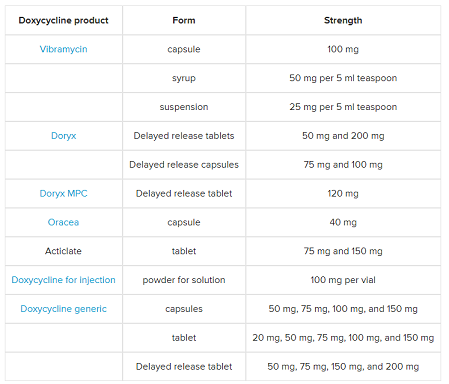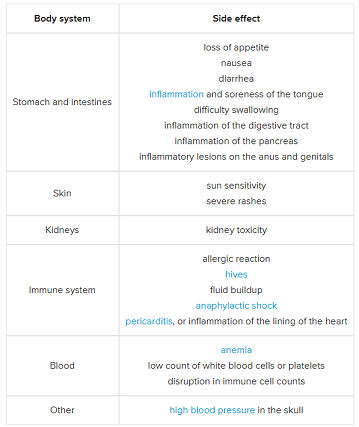What to know about doxycycline
Doxycycline is an antibiotic that can treat various bacterial infections. People can use oral or injectable forms.Sometimes, doctors use doxycycline to treat lung, nose, and throat infections. People can also use doxycycline to treat acne and rosacea.
Doxycycline may not be appropriate for everyone. It may interact with some other drugs and can cause side effects. Doctors will use caution when prescribing doxycycline to children and pregnant women.

In this article, we look at the many uses of doxycycline. We also discuss the side effects and warnings for people taking doxycycline.
Uses
Doxycycline is an antibiotic in the tetracycline class. Doctors prescribe doxycycline for various bacterial infections such as:
- lung infections
- sexually transmitted infections (STIs)
- nose and throat infections
- urinary tract infections (UTIs)
People can also take doxycycline in the following situations:
- Doxycycline can treat rare infections, such as anthrax, cholera, and typhus fever.
- People traveling to areas with a high risk of malaria may take doxycycline as a preventative measure.
- Some people take doxycycline to treat severe acne. Although acne is not an infection, the bacterium Propionibacterium acnes can trigger the condition.
- People with rosacea can use doxycycline without an antibiotic cream.
Many bacteria have developed a resistance to doxycycline. When doctors want to prescribe doxycycline, they can test the bacteria to make sure it will respond to the treatment.
If the benefits outweigh the risks, doctors can prescribe doxycycline to children 8 years old or younger who have severe or life threatening infections.
Brand names
The brand name of doxycycline delayed release tablets is Doryx and Doryx MPC.
Vibramycin is another brand name of doxycycline that is available in the following formulations:

powder for suspension
- syrup
- capsule
- Oracea is the brand name of the doxycycline product doctors use to treat rosacea lesions in adults.
How to take doxycycline
Doxycycline is available in seven different formulations. The following table lists the various forms and their strengths in milligrams (mg), or milligrams per 5 milliliters (mg per 5 ml).
Doryx MPC is a delayed release tablet with a special coating called a modified polymer enteric coat (MPC). This coating is resistant to acid and delays the release of doxycycline by 15–20 minutes.
Doctors will recommend taking doxycycline with a full glass of water to prevent it from irritating the esophagus, which is the tube that connects the stomach and the mouth.
If someone has irritation in their esophagus, they can take doxycycline with food or milk. People who take doxycycline with food or milk may absorb less doxycycline, but this should not significantly impact the results.
Doxycycline has many uses and, depending on the indication, the doctor will prescribe a different dose.
Children
If a child, weighing less than 45 kilograms (kg), has a severe or life threatening infection, the doctor will prescribe 2.2 milligrams per kilogram (mg/kg) of the child's body weight every 12 hours. Children weighing more than 45 kg can receive an adult dose.
Children 8 years and older with less severe infections and weighing less than 45 kg will receive 4.4 mg/kg in two doses on the first day. For the following days, the doctor will prescribe 2.2 mg/kg as a single dose or divided into two doses.
If the child weighs more than 45 kg and has a less serious infection, the doctor can prescribe the adult dosage.
Adults
When treating less serious infections in adults, doctors will prescribe 100 mg of doxycycline twice a day on the first day, followed by 100 mg once a day. If the infection is severe or life threatening, the doctor will prescribe 100 mg twice a day.
What are the side effects?
Doxycycline may not be appropriate for everyone. Anyone who has previously had a serious reaction to doxycycline or any other tetracycline should avoid doxycycline.
During tooth development, which occurs in the second half of pregnancy, in infancy, and childhood up to 8 years old, doxycycline may cause permanent tooth discoloration. Teeth may become a yellow-gray-brown color.
Doctors must evaluate the risks and benefits of prescribing doxycycline to young children or women during pregnancy.
Some people may develop Clostridium difficile diarrhea when taking doxycycline. This intestinal infection can range from mild to fatal.
The following table lists the possible side effects of doxycycline by body system.

Drug interactions
Tetracyclines, the drug class that includes doxycycline, may cause bleeding.
People who are taking drugs that prevent blood from clotting, known as anticoagulants, may need to take a smaller dose of their anticoagulant.
Doctors will not prescribe a penicillin antibiotic with doxycycline. Penicillins are antibiotics that kill bacteria, whereas doxycycline stops the growth of bacteria. When given together, doxycycline may block the action of penicillin.
Some over-the-counter antacids can affect how well the body absorbs doxycycline, including those that contain:
- aluminum
- calcium
- magnesium
- bismuth subsalicylate (contained in Pepto Bismol)
Doctors may advise people taking birth control pills to use a second method of contraception while taking doxycycline. This is because the antibiotic can reduce the effectiveness of oral contraceptives.
Other drugs that may interact with doxycycline include:
- barbiturates
- carbamazepine
- phenytoin
Doctors should take a full medication history before prescribing doxycycline.
Related articles And Qustion
Lastest Price from Doxycycline manufacturers

US $0.00/kg2025-04-25
- CAS:
- 564-25-0
- Min. Order:
- 1kg
- Purity:
- 0.99
- Supply Ability:
- 1000kg

US $1.00/KG2025-04-21
- CAS:
- 564-25-0
- Min. Order:
- 1KG
- Purity:
- 99%
- Supply Ability:
- 10 mt



